|
|
|
Benefits of Breastfeeding for the Infant
Benefits of Breastfeeding > for Infant •
Mother •
Family •
Hospital •
Environment & Society •
Other

Breastfeeding offers advantages for children that cannot be duplicated by any other form of feeding. The benefits of breastfeeding begin from the first moments after childbirth and last for many years after breastfeeding ends.
Saves Lives
- Currently there are 9 million infant deaths a year. Breastfeeding saves an estimated 6 million additional deaths from infectious disease alone.
 Provides Perfect Nutrition
Provides Perfect Nutrition
- Breast milk is a perfect food that cannot be duplicated. Mother's milk is tailor-made for your baby. In fact, it actually matches 50% of your baby's genetic material.
- Breast milk provides the right balance of nutrients. It is the most natural and nutritious way to encourage your baby's development.
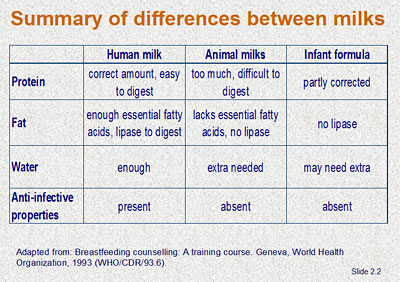
- To date, we have identified over 200 components in breast milk, and each plays a role not only in the baby's nutrition, but also in general development and growth as well as the development of the immune and nervous systems.
- Breast milk provides all of the calories your baby needs in the first 6 months. It has the perfect combination of proteins, fats, carbohydrate, and fluids that new-born babies require.
- Breast milk composition is very stable, even when the mother has a poor diet or is ill.
- Mother's milk contributes significantly to the growth and maturation of the baby's digestive system, which is not complete until around 6 months of age.
- The sugar (carbohydrate) and protein in breast milk are also designed to be used easily and more completely by the human baby.
- Breast milk prevents a shortage of vitamin A between 12 and 36 months.
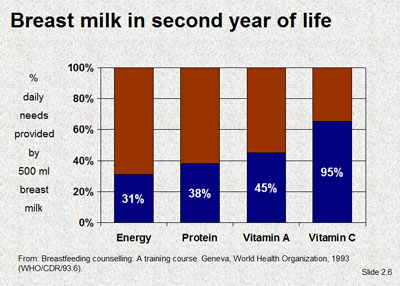
- With less salt and less protein, breast milk is easier on a baby's kidneys.
- Breast milk decreases the risk for vitamin E and Iron deficiency anemia.
- Breast milk is a dynamic fluid that changes in composition throughout the day and throughout the course of lactation. It provides for the baby the specific nutrients that are needed at each age and in each situation. The varying composition of breast milk keeps pace with the infant's individual growth and changing nutritional needs.
- Breast milk tastes different from feeding to feeding, Subtle changes in the taste of breast milk prepare babies to accept a variety of solid foods.
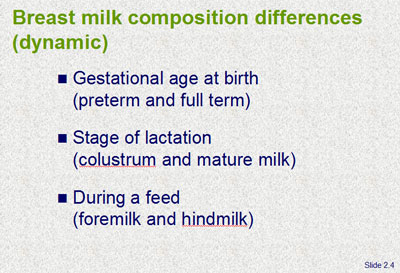
- Children receive the most complete and optimal mix of nutrients and antibodies.
- Breast milk provides adequate water for hydration.
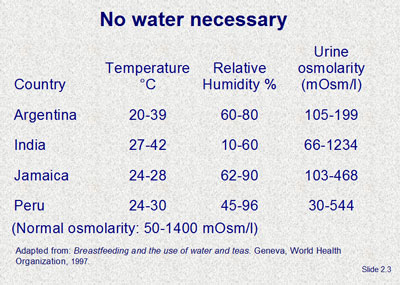
- All types of immunoglobulins are found in breast milk. The highest concentration is found in colostrum, the pre-milk that is only available from the breast the first three to five days of the baby's life.
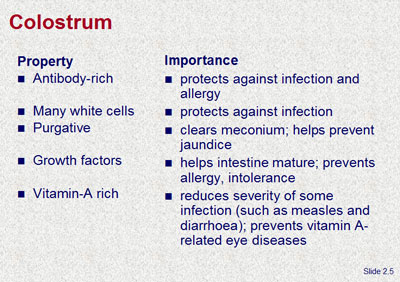
- Colostrum: Even before your baby is born, your breasts are making colostrum
- Colostrum is a Thick Milk That is Clear and Colorless or Yellowish.
- Is high in protein, which is exactly what your baby needs in the first few days
- Contains antibodies that protect baby from infections
- Helps baby pass the dark, tarry stools he has in the first day or two.
Nurse your baby often in the first few days so he'll get plenty of colostrum. It will also help your breastmilk supply to come in.
- When your baby is 2 to 5 days old, your milk will become thinner and bluish-white in color, like skim milk. Your breasts will also feel fuller. Congratulations, your milk has come in! When this happens, it is very important to nurse your baby frequently to keep your breasts from becoming too full or engorged.
Your milk changes as your baby feeds. When your baby first begins a nursing session, he gets foremilk. Foremilk is lower in fat and higher in lactose, a milk sugar that is important for development. The foremilk quenches your baby's thirst. As the feeding progresses, your milk transitions to hindmilk. Hindmilk is higher in fat, so it helps your baby feel full longer. During a feeding, it's important not to switch breasts until your baby has had a chance to get the hindmilk from the first breast. Some people think of hindmilk as the baby's dessert.
- Secretory IGA, a type of immunoglobulin that protects the ears, nose, throat, and the GI tract, is found in high amounts in breast milk throughout the first year. Secretory IGA does its work before it is digested in the stomach. Secretory IGA attaches to the lining of the nose, mouth, and throat and fights the attachment of specific infecting agents. Breast milk levels of IGA against specific viruses and bacteria increase in response to a maternal exposure to these organisms.
- Lactoferrin is an iron-binding protein that is found in breast milk, but is not available in formulas. It limits the availability of iron to bacteria in the intestines, and alters which healthy bacteria will thrive in the gut. Again, it is found in the highest concentrations in colostrum, but persists throughout the entire first year. It has a direct antibiotic effect on bacteria such as staphylococci and E. coli.
- Breast milk contains lysozyme (a potent digestive ingredient) at a level thirty times higher than in any formula. Interestingly, while other contents of breast milk vary widely between well nourished and poorly nourished mothers, the amount of lysozyme is conserved, suggesting that it is very important. It has a strong influence on the type of bacteria that inhabit the intestinal tract.
- Breast milk specifically encourages the growth of Lactobacillaceae, which are helpful bacteria that can inhibit many of the disease-causing gram-negative bacteria and parasites. In fact, there is a striking difference between the bacteria found in the guts of breast- and formula-fed infants. Breast-fed infants have a level of lactobacillus that is typically 10 times greater than that of formula-fed infants. Both the presence of the lactobacilli and the action of the lactoferrins and lysosomes help protect the infant by limiting the growth of unhealthy bacteria in the gut.

Toddler Health
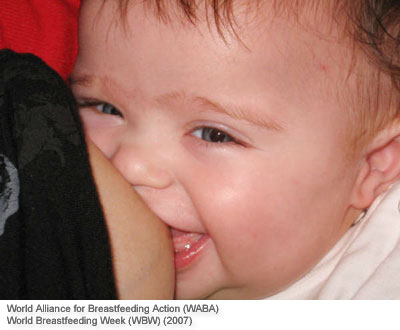
- Mothers of 67 infants were questioned about the types and duration of illness episodes requiring medical care between 16 and 30 months of age. Breastfeeding was noted to decrease the number of infant illnesses and indirectly improve toddler health.
 Bonds Mother and Child
Bonds Mother and Child
- Breastfeeding is a gentle way for newborns to transition to the world outside the womb.
- Breastfeeding provides physiological and psychological benefits for both mother and child. It creates emotional bonds, and has been known to reduce rates of infant abandonment.
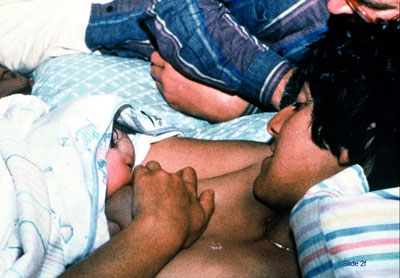
- The skin-to-skin contact encouraged by breastfeeding offers babies greater emotional security and enhances bonding.

Protects Against Infection
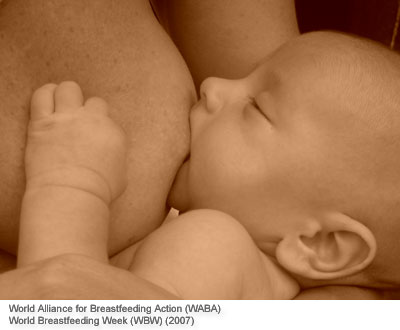
- Human milk has been called environmentally specific milk -- the mother provides it for her infant to protect specifically against the organisms that her infant is most likely to be exposed to.
- Breast milk helps your child fight germs and reduces the risk of developing infections. Research shows that breastfed infants have fewer and shorter episodes of illness.
- Illness and death are lower in children who are breastfeed until age 2 or 3.
- Breastfed babies cry less and have less digestive troubles, such as colic.
- Anti-infective properties
Only breast milk is alive with many different kinds of disease-fighting factors that help prevent mild to severe infections. Babies who are fully or almost-fully breastfed, or breast milk-fed babies, have significantly fewer gastrointestinal, respiratory, ear, and urinary infections.
- Antibodies in breast milk directly protect against infection. Other anti-infective factors create an environment that is friendly to good bacteria, referred to as normal flora and unfriendly to bad bacteria, viruses, or parasites.
- On average, breastfed babies have fewer infections in their early life. In particular, they have less diarrhoea and vomiting, chest infections, and ear infections compared to babies who are not breast fed. The main reason for this is that antibodies and other proteins are passed in the breast milk from mother to baby. These help to protect against infection.
- Breast milk also appears to have properties that help a baby's own immune system work best. If your baby does become ill when breastfeeding and receiving your milk, the infection is likely to be less severe.
- In developed countries such as the UK the reduction in the risk of infection is significant. In developing countries such as certain countries in Africa the reduction in the risk of infection is dramatic. For example, a review in 42 developing countries estimated that exclusive breastfeeding for six months, with partial breastfeeding continuing to 12 months, could prevent 1.3 million deaths each year in children under five years.

Protects Against Illnesses

- Compared with formula-fed children, those who are breastfed are healthier and have fewer symptoms and shorter illnesses when they do get sick.
- Protection against ear infections, respiratory illnesses, pneumonia, bronchitis, kidney infections, septicemia (blood poisoning),
- Increased resistance to infections. Baby is less likely to be hospitalized due to serious illness.
- Breastfed infants, and those who are fed expressed breast milk, have fewer deaths during the first year and experience fewer illnesses than babies fed ormula.
- Among the studies showing that breastfed infants have a lower risk of infection than non-breastfed infants are:
- In a 1993 University of Texas Medical Branch study, a longer period of breastfeeding was associated with a shorter duration of some middle ear infections (otitis media with effusion) in the first two years of life.
- A 1995 study of 87 infants found that breastfed babies had half the incidence of diarrheal illness, 19% fewer cases of any otitis media infection, and 80% fewer prolonged cases of otitis media than formula fed babies in the first twelve months of life.
- Breastfeeding appeared to reduce symptoms of upper respiratory tract infections in premature infants up to seven months after release from hospital in a 2002 study of 39 infants.
- A 2004 case-control study found that breastfeeding reduced the risk of acquiring urinary tract infections in infants up to seven months of age, with the protection strongest immediately after birth.
- The 2007 review for AHRQ found that breastfeeding reduced the risk of acute otitis media, non-specific gastroenteritis, and severe lower respiratory tract infections.
- Bowels. Less constipation. Stools of breastfed babies have a less-offensive odor.

Prevents Diarrhoea
- Diarrhoea is the leading cause of death among infants in developing countries. Infants under two months of age who are not breastfed are 25 times as likely to die of diarrhoea than infants exclusively breastfed. Continued breastfeeding during diarrhoea reduces dehydration, severity, duration, and negative nutritional consequences of diarrhoea.
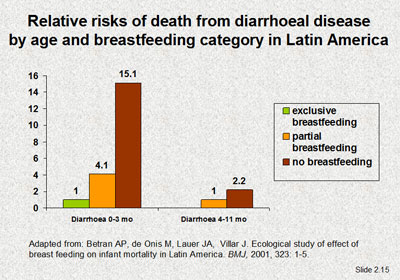
- Babies will breastfeed when they have diarrhoea and a fever even when they refuse other foods. This keeps fluids levels high, prevents dehydration and helps them get better faster.
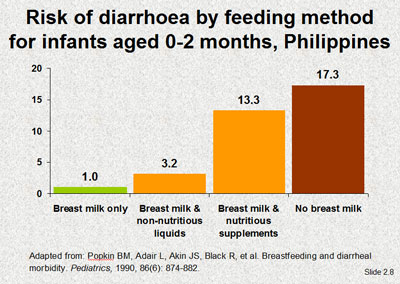
- Diarrhoeal disease is three to four times more likely to occur in infants fed formula than those fed breast milk.
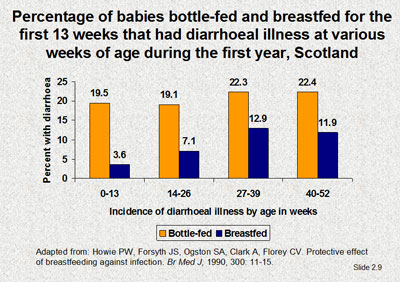
- Children less than 12 months of age had a lower incidence of acute diarrhoeal disease during the months they were being breastfed than children that were fed with formula during the same period.
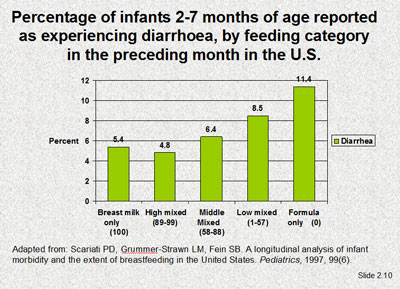
- Digestive system. Less diarrhea, fewer gastrointestinal infections in babies who are breastfeeding. Six months or more of exclusive breastfeeding reduces risk of food allergies. Also, less risk of Crohn's disease and ulcerative colitis in adulthood.
 Reduces Risk of Respiratory Infections
Reduces Risk of Respiratory Infections
- Short duration of breastfeeding involved another significant risk of recurrent respiratory infections and otitis media.
- Respiratory system. Evidence shows that breastfed babies have fewer and less severe upper respiratory infections, less wheezing, less pneumonia and less influenza.
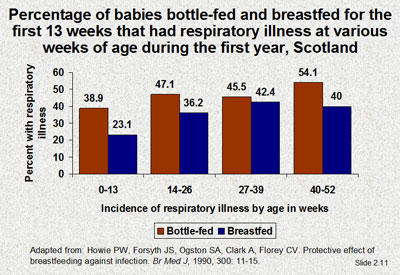
- Respiratory Syncytical Virus (RSV)
Breastfeeding was associated with a lower incidence of RSV infection during the first year of life.
- Respiratory Infections
The authors presented results found in infants with two or more episodes of acute chronic bronchitis. They found that approximately twice as many bottle-fed infants presented with the problem as those who were breastfed.
- There was a strong negative effect modification by breastfeeding: relative odds of respiratory illness with maternal smoking were seven times higher among children who were never breastfed then among those who were breastfed.
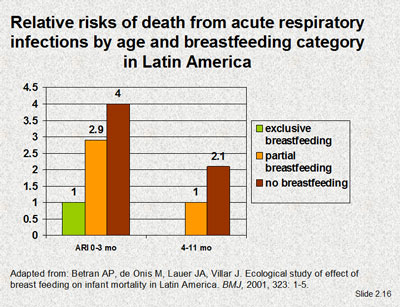
- Significantly increased risk for acute otitis media as well as prolonged duration of middle ear effusion were associated with male gender, sibling history of ear infection and not being breastfed.
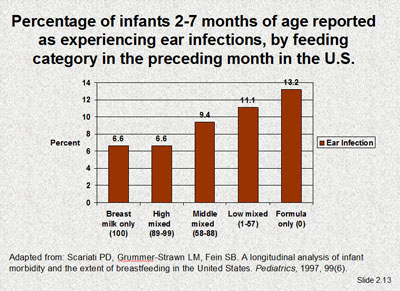
- Breastfeeding has been shown to reduce the likelihood of ear infections, and to prevent recurrent ear infections. Ear infections are a major reason that infants take multiple courses of antibiotics.
- Respiratory illness is far more common among formula-fed children. In fact, an analysis of many different research studies concluded that infants fed formula face a threefold greater risk of being hospitalized with a severe respiratory infection than do infants breast-fed for a minimum of four months.

Promotes the Recovery of the Sick Child
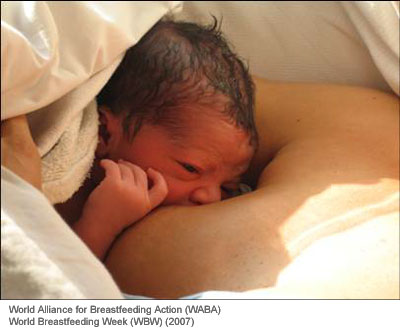
- Breastfeeding provides a nutritious, easily digestible food when a sick child loses appetite for other foods. When a child is ill or has diarrhea, breastfeeding helps prevent dehydration. Frequent breastfeeding also diminishes the risk of malnutrition and fosters catch-up growth following illness.
- General
Infants of a middle class and well-educated populations benefit from the breastfeeding practice and its protective effect, more so if they are exclusively breastfed and for a longer period.
- In developing countries, differences in infection rates can seriously affect an infant's chances for survival. For example, in Brazil, a formula-fed baby is 14 times more likely to die than an exclusively breast-fed baby.
- Immunologic Development
Enhanced fecal SIgA in breastfed infants is not cause solely by the presence of IgA in breast milk; it represents a stimulatory effect of breast milk on the gastrointestinal humeral immunologic development.
 General Morbidity
General Morbidity
- There is an inverse relationship to breastfeeding and morbidity. This was most prominent in the first year of life, but it was also present in the first three years.
 Infant Survival
Infant Survival
- There is an association between breastfeeding up to 6 months of age and survival of infants throughout the first year of life. The younger the infant and the longer the breastfeeding, the greater the estimated benefits in terms of death averted.

Provides Initial Immunization
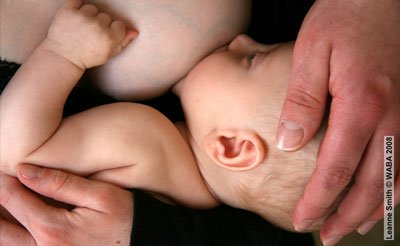
- Breast milk, especially the first milk (colostrum), contains anti-bacterial and anti-viral agents that protect the infant against disease. The colostrum coats the GI tract, preventing harmful bacteria and allergy -triggering protein molecules from crossing into baby's blood. Breast milk also aids the development of the infant's own immune system.
- During breastfeeding antibodies pass to the baby. This is one of the most important features of colostrum, the breast milk created for newborns. Breast milk contains several anti-infective factors such as bile salt stimulated lipase (protecting against amoebic infections), lactoferrin (which binds to iron and inhibits the growth of intestinal bacteria) and immunoglobulin A protecting against microorganisms.
 Enhances Vaccine Response
Enhances Vaccine Response
- Breastfed babies respond better to vaccinations. Breastfeeding helps the baby's immune system mature, protecting the baby in the meantime from viral, bacteria, and parasitic infections.
- Breastfeeding promotes earlier development of the infant immune system and increases the effectiveness of immunizations, increasing the protection against polio, tetanus, and diptheria vaccines.
- Breast milk can transfer specific or nonspecific immunities to the external mucosal surface of the intestine and possibly to the respiratory tract of the newborn. The acquisition of such passive immunity is particularly important in the early neonatal period when the immune system is immature.
- Many studies show that breastfeeding strengthens the immune system. During nursing, the mother passes antibodies to the child, which help the child resist diseases and help improve the normal immune response to certain vaccines.
- The antibody levels of immunized infants were significantly higher in the breastfed than the formula-fed group. These findings are strong evidence that breastfeeding enhances the active humoral immune response in the first year of life.
- The breastfed group had significantly higher antibody levels than two formula-fed groups together. Breastfed infants thus showed better serum and secretory responses to perioral and parenteral vaccines than the formula-fed, whether with a conventional or low-protein content.
 Premature and Low Birthweight Infants
Premature and Low Birthweight Infants
- Breastfeeding provides benefits not just for full-term infants but also for premature and low birthweight infants.
- Compared with premature infants who receive breast milk, those who receive formula have future IQs that are 8–15 points lower.
- Less necrotizing enterocolitis in premature infants
- Breastfeeding may protect preemies from infections and high blood pressure later in life
- For premature infants, breast milk:
- significantly shortens length of hospital stay
- reduces hospital costs
- hastens brainstem maturation
- reduces the risk of life-threatening disease of the gastrointestinal system and other infectious diseases
- Breastfeeding releases endorphins, which creates a feeling of
relaxation and well being in mother and baby, and is even an ideal pain reliever for the baby.

Availability

- Breast milk is always available, never spoiled and totally free.
- Breast milk availability works on a supply and demand basis. Maintaining a good milk supply depends on the regular stimulation provided by baby or by pumping. Double pumping helps increase your prolactin levels, which helps maintain milk supply. This benefit is important to working mothers who might have difficulty maintaining their milk supply because baby isn't always available for breast stimulation.
- No mistakes in mixing.

Easily Digested
- Since nature designed human milk for human babies, breast milk is the most nutritious and easily digested food your baby can receive. A nutritious, yet easily digested first food is important for a baby's immature digestive tract. Babies uses less energy, yet break breast milk down more completely into its basic ingredients, so the nutrients, anti-infective factors, and all the other ingredients in your milk are more available to fuel the baby's body functions and to promote the baby's growth and development.
- Mother's milk is easier to digest and almost completely assimilated by the baby. This is why breastfed babies feed more frequently than formula-fed babies. Breastfed babies also make liquid stools that contain almost no solid matter (and do not smell offensive).
 Bio-Avalibility
Bio-Avalibility
- Bio-availability is a fancy way of referring to how well the body can use the nutrients in a food. The high bio-availability of nutrients in breast milk means your baby gets more benefits from the nutrients it contains even for nutrients that appear in lower levels in breast milk when compared to infant formulas (because your baby's body can absorb and use them most effectively). It also means your baby saves the energy that would be needed to eliminate any nutrients he/she had difficulty digesting or using.
- While carnitine is present in both breast milk and formula, the carnitine in breast milk has higher bioavailability. Breast-fed babies have significantly higher carnitine levels than their counterparts. Carnitine is necessary to make use of fatty acids as an energy source. Other functions of carnitine have been hypothesized, but have not yet been proven.

Suitability
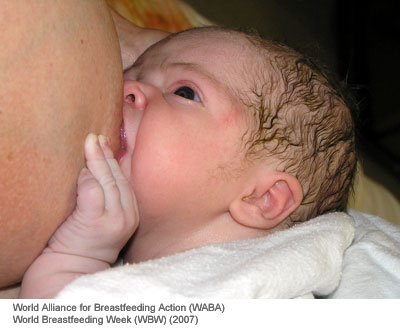
- Your milk is best suited to, and so it is more gentle on, your baby's body systems. The suitability of your milk plays a role in your milk's digestibility, and it allows your baby's body to function most efficiently while spending a lot less energy on body functions. Suitability is also thought to be one reason that breastfed babies are less likely to develop allergic-related skin conditions and asthma.
- The composition digestibility, bio-availability, and suitability of your milk means that your baby's body is able to work less to receive more nourishment. Your baby also receives properties to help fight infections.
- Your milk is the perfect first food to help your baby achieve every aspect of ideal growth and development.
 Supports Food Security
Supports Food Security
- Breast milk provides total food security for an infant's first six months. It maximizes food resources, both because it is naturally renewing, and because food that would otherwise be fed to an infant can be given to others. A mother's milk supply adjusts to demand; only extremely malnourished mothers have a reduced capacity to breastfeed.
 Enhances Development and Intelligence
Enhances Development and Intelligence
- Enhanced neurological development that may result in higher IQs
- Human survival depends more on brain power than on strong muscles, rapid growth (rapid maturity), or body size, so your milk is rich in the nutrients that best promote brain growth and nervous system development.
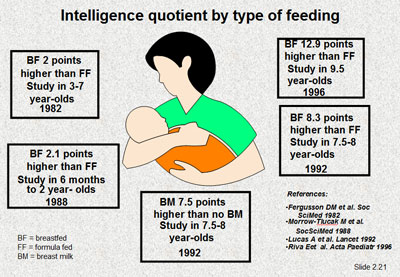
- Breast milk is high in fat. fatty acids for brain development. Some recent NICHD-supported research also suggests that breast milk contains important and essential fatty acids, a key source of energy and building blocks that help an infant's brain
develop. Two specific fatty acids, known as DHA and AA, may help increase infants' cognitive skills.
- Breastfed infants develop higher IQ's, and have improved brain and nervous system development; IQ advantage of 10-12 points studied at ages 8, 12, and 18. (Breastfeeding is considered the 4th trimester in brain growth and development...there are specific proteins in breast milk that promote brain development))
- Higher intelligence
- Studies examining whether breastfeeding in infants is associated with higher intelligence later in life include:
- Horwood, Darlow and Mogridge (2001) tested the intelligence quotient (IQ) scores of 280 low birthweight children at seven or eight years of age. Those who were breastfed for more than eight months had verbal IQ scores 6 points higher (which was significantly higher) than comparable children breastfed for less time. They concluded "These findings add to a growing body of evidence to suggest that breast milk feeding may have small long term benefits for child cognitive development."
- A 2005 study using data on 2,734 sibling pairs from the National Longitudinal Study of Adolescent Health "provide[d] persuasive evidence of a causal connection between breastfeeding and intelligence."
- In 2006, Der and colleagues, having performed a prospective cohort study, sibling pairs analysis, and meta-analysis, concluded that "Breast feeding has little or no effect on intelligence in children." The researchers found that "Most of the observed association between breast feeding and cognitive development is the result of confounding by maternal intelligence."
- The 2007 review for the AHRQ found "no relationship between breastfeeding in term infants and cognitive performance."
- The 2007 review for the WHO concluded "Subjects who were breastfed experienced... higher performance in intelligence tests."
- Two initial cohort studies published in 2007 suggest babies with a specific version of the FADS2 gene demonstrated an IQ averaging 7 points higher if breastfed, compared with babies with a less common version of the gene who showed no improvement when breastfed. FADS2 affects the metabolism of polyunsaturated fatty acids found in breast breast milk, such as docosahexaenoic acid and arachidonic acid, which are known to be linked to early brain development. The researchers were quoted as saying "Our findings support the idea that the nutritional content of breast milk accounts for the differences seen in human IQ. But it's not a simple all-or-none connection: it depends to some extent on the genetic makeup of each infant." The researchers wrote "further investigation to replicate and explain this specific gene–environment interaction is warranted."
- In "the largest randomized trial ever conducted in the area of human lactation," between 1996 and 1997 maternity hospitals and polyclinics in Belarus were randomized to receive or not receive breastfeeding promotion modeled on the Baby Friendly Hospital Initiative. Of 13,889 infants born at these hospitals and polyclinics and followed up in 2002-2005, those who had been born in hospitals and polyclinics receiving breastfeeding promotion had IQs that were 2.9-7.5 points higher (which was significantly higher). Since (among other reasons) a randomized trial should control for maternal IQ, the authors concluded in a 2008 paper that the data "provide strong evidence that prolonged and exclusive breastfeeding improves children's cognitive development."
- Maximizes a Child's Physical and Intellectual Potential. Malnutrition among infants up to six months of age can be virtually eradicated by the practice of exclusive breastfeeding. For young children beyond six months, breast milk serves as the nutritional foundation to promote continued healthful growth. Premature infants fed breast milk show higher developmental scores as toddlers and higher IQs as children than those not fed breast milk.
 Higher IQ
Higher IQ
- Research has found that breastfed babies perform better on different kinds of intelligence tests as they grow older.
- Children who had consumed mother's milk by tube in early weeks of life had a significantly higher IQ at 7.5 to 8 yr. than those who received no maternal milk, even after adjustment for differences between groups and mothers' educational and social class.
- Mother's milk contains the fatty acids essential to the development of the baby's nervous system and vision. This may be one of the reasons why breastfed babies' IQ are 8 to 10 points higher than that of formula-fed babies.
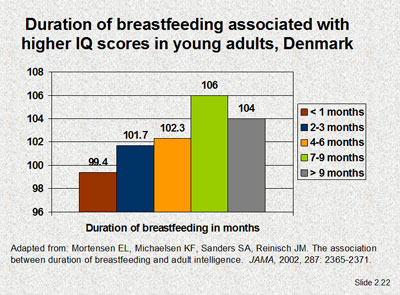
- Breastfed children scored score higher on cognitive and IQ tests at school age, and also on tests of visual acuity.
- Higher IQ in breastfed children. Cholesterol and other types of fat in breast milk support the growth of nerve tissue.
 Cognitive Development
Cognitive Development
- Supplementary regression analysis examining the strength of relationship between duration of breastfeeding and cognitive development show a small but significant relationship between duration of breastfeeding and scores on the mental development index of the Bayley Scales at 1 and 2 years.
- In 771 low-birth-weight infants, babies whose mothers chose to provide breast milk had an 8-point advantage in mean Bayley's mental developmental index over infants of mothers choosing not to do so.
 Social Development
Social Development
- The psychomotor and social development of breastfed babies clearly differs from that of bottle-fed ones and leads at the age of 12 months to significant advantages of the psychomotor and social capabilities.
- Significant evidence suggests that breast-fed children develop fewer psychological, behavioral and learning problems as they grow older. Studies also indicate that cognitive development is increased among children whose mothers choose to breastfeed.
- In researching the psychological benefits of breast milk, one researcher found that breast-fed children were, on average, more mature, assertive and secure with themselves as they developed.
- Developmental and emotional factors
- One study reported that performance in childhood intelligence tests was better in children who had been breastfed compared to those who had been bottle fed. It is difficult to assess emotional factors, and no firm conclusions can be drawn. However, it is thought that breastfeeding enhances the 'bonding' process between baby and mother.
 Psychological Factors
Psychological Factors
- You mentioned that these scientists suggest that the only difference between formula and breast milk is psychological. I strongly disagree that this is the only difference, but I agree that the psychological difference can have profound implications. Over the last decade-and-a-half, the developing field of psychoneuroimmunology has demonstrated repeatedly that an individual's psychological state has a direct effect on his or her immune function. Perhaps the nursing experience by itself does directly improve the immune status of infants.

Long Term Benefits for Infants

- Advantages in long-term health
- Many studies have looked at the possible long-term health benefits of breastfeeding. There is now good evidence that, on average, the following health problems in later life are less common in those who had been breast fed compared to those who had not:
- Some benefits of breastfeeding become apparent as the child grows older.
- In one study, breastfeeding did not appear to offer protection against allergies.[41] However, another study showed breastfeeding to have lowered the risk of asthma, protect against allergies, and provide improved protection for babies against respiratory and intestinal infections.[42]
- A review of the association between breastfeeding and celiac disease (CD) concluded that breast feeding while introducing gluten to the diet reduced the risk of CD. The study was unable to determine if breastfeeding merely delayed symptoms or offered life-long protection.[43]
- An initial study at the University of Wisconsin found that women who were breast fed in infancy may have a lower risk of developing breast cancer than those who were not breast fed.[44]
- Breastfeeding may decrease the risk of cardiovascular disease in later life, as indicated by lower cholesterol and C-reactive protein levels in adult women who had been breastfed as infants.[15][45] Although a 2001 study suggested that adults who had been breastfed as infants had lower arterial distensibility than adults who had not been breastfed as infants[46], the 2007 review for the WHO concluded that breastfed infants "experienced lower mean blood pressure" later in life[15]. Nevertheless, the 2007 review for the AHRQ found that "the relationship between breastfeeding and cardiovascular diseases was unclear"[14].
- Breastfeeding protects against developing chronic diseases such as: celiac disease, inflammatory bowel disease, asthma, and childhood cancers.
- Mother's milk protects the baby from many diseases, both during breastfeeding and throughout life, first by conferring passive immunity and then by stimulating the baby's own immune system. These effects increase with breastfeeding duration
 AIDS
AIDS
- The lack of a dose response affect between breastfeeding and perinatal HIV-1 transmission in the presence of the protective effect of breastfeeding against common causes of early childhood morbidity and mortality support the current WHO recommendation that breastfeeding should continue to be promoted in all developing countries, including those with high HIV-1 prevalence rates in women of child bearing age.
 Allergies
Allergies
- Protection From Allergies
Breastfeeding delays the onset of hereditary allergic disease, and lowers the risk of developing allergic disease. Breastfed children have less of a tendency to develop allergic diseases.
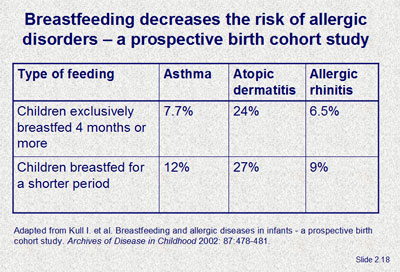
- In children who are at risk for developing allergic diseases (defined as at least one parent or sibling having atopy), atopic syndrome can be prevented or delayed through exclusive breastfeeding for four months, though these benefits may not be present after four months of age. However, the key factor may be the age at which non-breast milk is introduced rather than duration of breastfeeding.
- Atopic dermatitis, the most common form of eczema, can be reduced through exclusive breastfeeding beyond 12 weeks in individuals with a family history of atopy, but when breastfeeding beyond 12 weeks is combined with other foods incidents of eczema rise irrespective of family history.
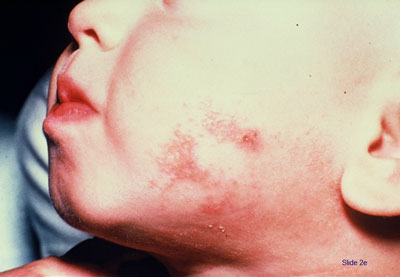
- Allergic factors:
The cows' milk protein used in most formulas is a foreign protein. When babies are exposed to non-breast milk, they actually develop antibodies to the foreign protein.
Research has shown that without exception the important food allergens found in milk and soybean formulas are stable to digestion in the stomach for as long as 60 minutes (as compared to breast milk protein which is digested in the stomach within 15 minutes).
The foreign proteins pass through the stomach and reach the intestines intact, where they gain access and can produce sensitization. While research in this area is still relatively new, this early exposure to foreign proteins may be the predisposing factor in such illnesses as eczema and asthma.
The effects of early exposure to foreign protein are explored in three abstracts in the Journal of Allergy and Clinical Immunology, from January of 1996.
Allergic Families
Breastfeeding, even for short periods, was clearly associated with lower incidence of wheezing, prolonged colds, diarrhea, and vomiting.
 Appendix
Appendix
- Breastfeeding decreases the risk for acute appendicitis.
 Arthritis
Arthritis
- For Joints and muscles: Breastfeeding decreases the risk for rheumatoid arthritis. Juvenile rheumatoid arthritis is less common in children who were breastfed.
 Asthma
Asthma
- Breast fed infants are significantly protected against asthma, if at risk for allergic disorders and exclusively breastfed for at least 4 months.
 Bone Density Increased
Bone Density Increased
 Childhood Cancer
Childhood Cancer
- Breast milk decreases the risk of childhood cancer.
- Children who are artificially fed or breastfed for only 6 months or less, are at an increased risk of developing cancer before age 15. The risk of artificially fed children was 1-8 times that of long-term breastfed children, and the risk for short term feeders was 1-9 times that of long term breast feeders.
- It is important to note that children who are breast-fed for less than six months do not appear to have any decreased cancer risk compared to bottle-fed children.
 Chron's Disease
Chron's Disease
- Breast fed infants have a lower risk of the two most common inflammatory bowel diseases: Crohn's disease, ulcerative colitis
- Lack of breastfeeding is a risk factor associated with later development of Crohn's disease.
 Cryptorchidism (Undescended Testicle)
Cryptorchidism (Undescended Testicle)
- Studies show a significant association of cryptorchidism and lack of breastfeeding.
 Dental Health
Dental Health
- Among breastfed infants, the longer the duration of nursing the lower the incidents of malocclusion. They also have fewer cavities and are less likely to require braces. Less need for orthodontics in children breastfed more than a year.
- The activity of sucking at the breast enhances development of baby's facial and oral muscles, facial bones, structure and aids in optimal dental development. Breastfeeding also promotes enhanced speech.
- Suckling at the breast promotes good jaw development and encourages the growth of straight, healthy teeth.
 Diabetes Mellitus
Diabetes Mellitus
- Breastfeeding may protect your baby from developing Insulin-Dependent Diabetes Mellitus [IDDM], now known as diabetes mellitus type 1.
- Children who developed in New South Wales, Australia were matched with healthy children (ratio 1:2) of the same sex and age for comparison. Those who were exclusively breastfed during their first three months of life had a 34% lower risk of developing insulin-dependent diabetes than those who were not breastfed. Children given cow's milk-based formula in their first three months were 52% more likely to develop IDDM than those not given cow's milk formula.
- Infants exclusively breastfed have less chance of developing diabetes mellitus type 1 than peers with a shorter duration of breastfeeding and an earlier exposure to cow milk and solid foods. Breastfeeding also appears to protect against diabetes mellitus type 2, at least in part due to its effects on the child's weight.
 Eczema
Eczema
- Eczema, an allergic reaction, is significantly rarer in breast-fed babies. A review of 132 studies on allergy and breastfeeding concluded that breastfeeding appears to help protect children from developing allergies, and that the effect seems to be particularly strong among children whose parents have allergies.
- Breast fed infants are significantly protected against eczema, if at risk for allergic disorders and exclusively breastfed for at least 4 months.
- Eczema was less common and milder in babies who were breastfed (22%) and whose mothers were on a restricted diet (48%). In infants fed casein hydrolysate, soymilk or cows milk, 21%, 63%, and 70% respectively, developed atopic eczema.
 Eyesight
Eyesight
- Breastfeeding enhances the babies vision and helps develop better eye function. Visual acuity is higher in babies fed breast milk. This is due mostly to certain types of fat (fatty acid chains) in breast milk.
 Gastroesophageal Reflex
Gastroesophageal Reflex
- Breastfed neonates demonstrate gastroesophageal reflux episodes of significantly shorter duration than formula-fed neonates.
 Haemophilus Influenza
Haemophilus Influenza
- In a population based case control study of risk factors for primary invasion of haemophilus influenza, type B disease, breastfeeding was protective of infants less than 6 months of age.
 Heart Disease
Heart Disease
- Reduced risk of heart disease later in life
As children grow into adults, several studies have shown that people who were breast-fed as infants have lower blood pressure on average than those who were formula-fed. Thus, it is not surprising that other studies have shown that heart disease is less likely to develop in adults who were breast-fed in infancy.
- Heart and circulatory system. Evidence suggests that breastfed children may have lower cholesterol as adults.
- Heart rates are lower in breastfed infants.
 Herpes Simplex
Herpes Simplex
- Mothers milk could play a role in the protection of newborns from Herpes Simplex virus II contamination.
 Hodgkin's Disease
Hodgkin's Disease
- A statistically significant protective effect against Hodgkin's disease among children who are breastfed at least 8 months compared with children who were breastfed no more than 2 months.
 Inguinal Hernia
Inguinal Hernia
- Breastfeeding decreases the risk for inguinal hernia.
- Human milk contains gonadotropin releasing hormone, which may affect the maturation of neonatal testicular function. This case control study showed breastfed infants had a significant dose response reduction in inguinal hernia.
 Jaundice
Jaundice
- Colostrum (the first milk) is a gentle, natural laxative that helps clear baby's intestine, decreasing the chance for jaundice to occur.
 Juvenille Rheumatoid Arthritis (JRA)
Juvenille Rheumatoid Arthritis (JRA)
- Preliminary data from researchers at the University of North Carolina and Duke University comparing 54 children with JRA and a control group without JRA of similar age and race indicates that children who were breastfed were only 40% as likely to develop JRA.
 Leukemia
Leukemia
- Breastfeeding protects your baby from childhood leukemia. Breast fed infants suffer less often from this form of cancer.
 Meningitis
Meningitis
- Breast fed infants are less likely to suffer from meningitis.
 Multiple Sclerosis
Multiple Sclerosis
- Although thought to be multifactorial in origin, and without a clearly defined etiology, lack of breastfeeding does appear to be associated with an increased incidence of multiple sclerosis.
 Necrotizing Enternal Colitis (NEC)
Necrotizing Enternal Colitis (NEC)
- Necrotizing enterocolitis (NEC) is an acute inflammatory disease in the
intestines of infants. Necrosis or death of intestinal tissue may follow. It is mainly found in premature births.
- In one study of 926 preterm infants, NEC developed in 51 infants (5.5%). The death rate from necrotizing enterocolitis was 26%. NEC was found to be six to ten times more common in infants fed formula exclusively, and three times more common in infants fed a mixture of breast milk and formula, compared with exclusive breastfeeding.
- In infants born at more than 30 weeks, NEC was twenty times more common in infants fed exclusively on formula. A 2007 meta-analysis of four randomized controlled trials found "a marginally statistically significant association" between breastfeeding and a reduction in the risk of NEC.
 Obesity
Obesity
- Breastfed infants may have a lower risk of obesity in childhood and in adolescence. Breastfeeding appears to reduce the risk of extreme obesity in children aged 39 to 42 months. The protective effect of breastfeeding against obesity is consistent, though small, across many studies, and appears to increase with the duration of breastfeeding.
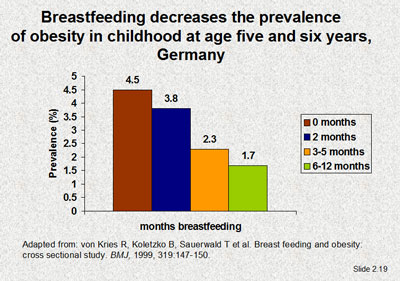
- Several recent studies have shown that children who were breast-fed are significantly less likely to become obese later in childhood. Formula feeding is linked to about a 20 to 30 percent greater likelihood that the child will become obese.
 Otitis Media
Otitis Media
- Otitis Media is inflammation of the middle ear, or middle ear infection. Breastfeeding decreases the risk of ear infections.
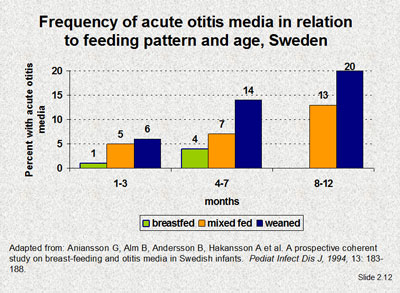
 Pyloric Stenosis
Pyloric Stenosis
- Breastfeeding decreases risk for pyloric stenosis.
 Sudden Infant Death Syndrome (SIDS)
Sudden Infant Death Syndrome (SIDS)
- Breastfed babies have better arousal from sleep at 2–3 months. This coincides with the peak incidence of sudden infant death syndrome. A study conducted at the University of Münster has shown that breastfeeding reduces the risk of sudden infant death syndrome by approximately 50% at all ages throughout infancy.
- A study indicated that breastfeeding was protective against SIDS, Consistent with an effect mediated through the prevention of gastrointestinal and/or respiratory disease.
- Not breastfeeding at discharge from an obstetric hospital at any stage of the infants life was associated with an increased risk of SIDS.
- Reduced risk of SIDS (sudden infant death syndrome) Statistics reveal that for every 87 deaths from SIDS, only 3 are breastfed.
 Tonsillitis
Tonsillitis
- Children who are breastfed are less likely to require tonsillectomies.
 Urinary tract
Urinary tract
- Fewer urinary tract infections in breastfed infants.
 Wheezing
Wheezing
- Breastfeeding seems to protect against wheezing, respiratory tract illnesses in the first four months of life, particularly when other risk factors are present.
Benefits of Breastfeeding > for Infant •
Mother •
Family •
Hospital •
Environment & Society •
Other
21 February, 2016
|
